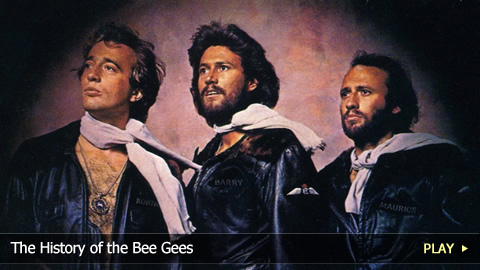The History of the Bee Gees

England
The Bee Gees then tried their luck back in England. While making the trip, their single “Spicks and Specks” topped the Australian charts and this helped them land a contract with Polydor Records.
Debut
With Barry playing rhythm guitar and sharing lead vocals with Robin, and Maurice handling backup and multiple instruments, the trio kept recording. In 1967, they released the psychedelic rock album Bee Gees 1st internationally, and it cracked the UK and U.S. top ten.
UK Success
That same year, “Massachusetts” off Horizontal was their first chart-topping UK hit. Because 1968’s “I’ve Gotta Get a Message to You” duplicated that success, it was included on the American version of the Idea record.
Change
1969 was a year of change: though the group pleased critics with their country and progressive rock experiments on the double LP Odessa, they suffered from tensions that led to Robin’s departure. Their first album without him was the commercially disappointing Cucumber Castle.
American Success
The trio was back with their beautiful harmonies on the 1970 LP 2 Years On. The next year, the album Trafalgar produced their first American number one.
Disco
In 1972, the band showcased diverse musical styles on To Whom It May Concern. Sales for their next two albums fizzled, so the Bee Gees changed their sound. Thanks to the disco-influenced Main Course, they reached the U.S. top twenty in 1975.
“You Should Be Dancing”
By putting Barry’s high-pitched vocals to good use and incorporating R&B into their disco sound, the Bee Gees became a household name in the U.S. with 1976’s Children of the World. That LP also gave them the chart-topping smash, “You Should Be Dancing.”
“Saturday Night Fever”
The Bee Gees capitalized on the disco craze by contributing to the movie soundtrack for 1977’s “Saturday Night Fever.” That became one of the best-selling soundtracks in history, and produced three number ones for the band. They continued to rule the charts by working with other artists, including their brother Andy.
More American Success
The poor reception of the film “Sgt. Pepper’s Lonely Hearts Club Band” did little to dampen the Bee Gees’ achievements: they had three more American number ones off 1979’s chart-topping Spirits Having Flown.
End of Disco
However, the end of the ‘70s also meant the end of disco. Though the Bee Gees had some European success and received a Grammy nomination for the “Staying Alive” movie soundtrack, commercial success eluded them in the U.S. with their ‘80s albums Living Eyes and E.S.P.
Solo Projects
Meanwhile, the members worked on solo projects and achieved massive success through collaborations with stars like Barbra Streisand and Dionne Warwick. Following Andy’s unexpected death in 1988, they reached the American top ten with the title track from One the next year.
More Music
During the early ‘90s, they released several compilations and the more electronic-sounding High Civilization. Despite health problems, they found UK chart success in 1993 with Size Isn’t Everything.
One Night Only
The Bee Gees returned to the American top twenty thanks to 1997’s Still Waters. Later that year, their “One Night Only” performance in Las Vegas kicked off a series of tour dates that lasted until 1999.
Last Album
Their last album as a trio was the successful 2001 disc This Is Where I Came In, as Maurice died from a heart attack two years later. Though Bee Gees compilations were subsequently released, the brothers made music on their own and worked with other acts. They also performed together periodically but had to put discussions about a reunion on hold after Robin’s liver cancer diagnosis in 2011.
Legacy
The Gibb brothers distinguished themselves in pop and disco with their soulful harmonies and vocal abilities. They’ve also triumphed by writing countless successful singles for numerous other artists. With many Grammys and millions in album sales, it’s no surprise the Bee Gees have influenced thousands and are one of history’s most successful musical acts.